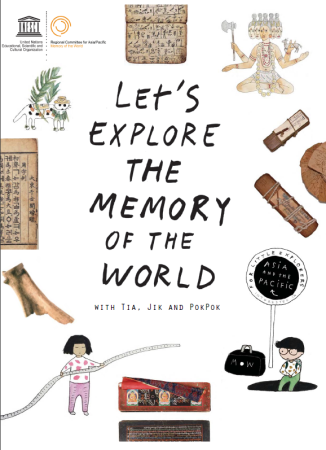ACTIONS
- Protect and safeguard cultural and natural heritage
- Learning and educational opportunities
- Cultural participation/social inclusion
- Sustainable tourism
- Support research
- Employment (recruiting, training, safety)
- Energy consumption, greenhouse gas emissions
- Waste management and reduction
- Transport (forms of, energy use)
- Commercial activities including copyright and IP
- Governance and management
- Security, disaster preparedness, risk reduction
- External partnerships and collaborations
- Toolkit/framework/roadmap
- Children's book
Let’s Explore the Memory of the World with Tia, Jik and PokPok - For Little Explorers interested in Asia and the Pacific

Intended Audience
Young children, specifically those who are enrolled in primary schools
- S. Sasaki, UNESCO and UNESCO Office in Bangkok
The resource addresses the Memory of the World Programme ‘To introduce young children to the value of documentary heritage and stimulate their interest in diverse histories and cultures’
Avaiable in
- English
SDGs LINKAGES
This open-access resource helps introduce the importance and value of documentary heritage to young children and is helpful for educators and teaching professionals to address SDG targets 4.1 (quality education), 4.4 (enhancement of skills, cultural diplomacy and intercultural understanding in particular), 4.7 (knowledge and skills for sustainable development), 5.5 (highlight women’s significance in relevant documentary heritage-related events and promote girls’ participation), 10.2 (empowerment and inclusion of all), 11.4 (protection of documentary heritage), 16.10 (public access to information), and 17.16 (increase the diversity of global stakeholders across sectors and nature future stakeholders).
Click on the SDG Target to discover Our Collections Matter indicators
-
Our Collections Matter indicators:
- Number of programmes drawing on collections that support children at risk of exclusion or otherwise not completing primary and secondary education.
-
Our Collections Matter indicators:
- Number of young people and adults in skills-development activities and programmes drawing on collections, for employment, decent jobs and entrepreneurship.
- Increase in number of young people and adults in such programmes.
- Number and proportion of staff who have received training in the last year, to better support their contribution to the SDGs.
- Programs and processes in place to ensure the availability of a skilled workforce.
-
Our Collections Matter indicators:
- Numbers of people in each type of programme drawing on collections from different demographic groups.
- Increases in numbers of people in each type of programme from different demographic groups.
- Proportion of people involved in such programmes in relation to overall audience size.
- Evidence that learners have acquired knowledge and skills to promote sustainable development.
-
Our Collections Matter indicators:
- Number and proportion of women included in programmes, partnerships and processes relating to collections and collections-based institutions at:
i. foundation/entry levels
ii. intermediate levels
iii. senior levels, including management, leadership and decision-making.
- Number and proportion of women included in programmes, partnerships and processes relating to collections and collections-based institutions at:
-
Our Collections Matter indicators:
- Collections development to ensure that collections effectively meet the needs of all, irrespective of age, sex, disability, race, ethnicity, origin, religion or economic or other status.
- Number and proportion of educational and participatory programmes that promote participation irrespective of social or other status.
- Numbers and proportions of people making use of collections in relation to the demographic of the local population.
- Numbers and proportions of people involved in focused programmes aimed at promoting social, economic and political inclusion.
- Numbers and proportions of people from different demographic groups involved in decision-making processes relating to collections and collections-based institutions.
- Number and types of partnerships that build relationships with marginalized groups, individuals and communities.
-
Our Collections Matter indicators:
- Total expenditure (public and private) per capita spent on the preservation, protection and conservation of all cultural and natural heritage, by type of heritage.
- Plans, policies and procedures in place for the safe use of collections for a variety of purposes, protecting and safeguarding both collections and those who use them.
- Plans, policies and procedures in place for the identification, safeguarding and protection of cultural and natural heritage at risk.
- Collecting programmes in place to protect, safeguard and make use of cultural and natural heritage, addressing the needs of communities and stakeholders, and ensuring that collections can be an effective resource for sustainable development.
- Number and diversity of educational, awareness-raising, research programmes, and partnerships that aim to strengthen protection of cultural and natural heritage.
-
Our Collections Matter indicators:
- Adopt and implement constitutional, statutory and/or policy guarantees for public access to information.
- Plans in place, and plans implemented to enhance public access to information relating to collections.
- Plans in place, and plans implemented to support fundamental freedoms, in line with human rights, national and international agreements and legislation.
- Plans and procedures in place for public access to information relating to the operation and management of collections-based institutions.
- Complaint mechanism in place for public to use where public access to information and fundamental freedoms not supported or fulfilled.
-
Our Collections Matter indicators:
- Number and/or increase in number, and diversity of global and international multi-stakeholder partnerships that share collection-related knowledge, expertise, technology and financial resources to address the SDGs, or that otherwise involve collections-based organisations and institutions.
- Number and/or increase in number, and diversity of global and international multi-stakeholder partnerships involving developing countries that share collection-related knowledge, expertise, technology and financial resources to address the SDGs.
